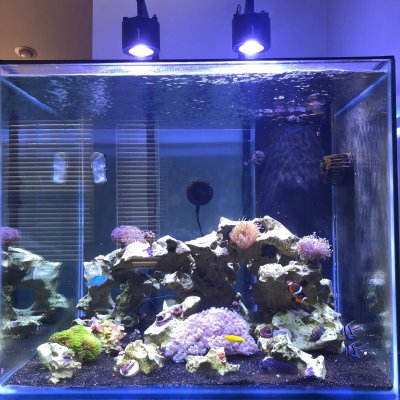Stability is key. The most successful reefers maintain very stable parameters, lighting, flow. Instability causes stress, stress weakens livestock immune systems, weak immune systems lead to sickness, death, and eventual failure.
Do research on every aspect of reef aquarium keeping that pertains to your setup. Always know the impact of everything you do and/or add to your tanks. Is that new coral suitable for your level of involvement with your tank? How is the demeanor of that new fish/invert? Will it terrorize the other inhabitants or nuke the tank if it dies?
Attention to detail, being observant, and learn your tank'. More often than not, just the simple act of taking 10 or so minutes everyday and just watch your tank. Look at every coral, every fish, the sound of your equipment etc. Learn their behaviors, if there's an issue in most cases you will spot it very early and the chances of success in resolving it are much higher than if you do not know what everything is supposed to be doing.
Maintenance, always do that. Just because that pump has been running perfectly for 4-5 months doesn't mean that it will continue to do so for another 5 months. You would be amazed at the bio-film build up that takes place in a return, skimmer, or wave pump motor in a very short period of time. Take a couple hours every 3-4 months and pull out each piece of equipment and give it a good cleaning and inspection. Not only will it help ensure the pump will continue to run properly, but will give you the opportunity to spot worn parts early on and get replacement parts before they fail at 2:30 AM on a Saturday morning.
Above all else, patience. If you are one for instant gratification, or are wanting immediate results, this is not the hobby for you.
Do research on every aspect of reef aquarium keeping that pertains to your setup. Always know the impact of everything you do and/or add to your tanks. Is that new coral suitable for your level of involvement with your tank? How is the demeanor of that new fish/invert? Will it terrorize the other inhabitants or nuke the tank if it dies?
Attention to detail, being observant, and learn your tank'. More often than not, just the simple act of taking 10 or so minutes everyday and just watch your tank. Look at every coral, every fish, the sound of your equipment etc. Learn their behaviors, if there's an issue in most cases you will spot it very early and the chances of success in resolving it are much higher than if you do not know what everything is supposed to be doing.
Maintenance, always do that. Just because that pump has been running perfectly for 4-5 months doesn't mean that it will continue to do so for another 5 months. You would be amazed at the bio-film build up that takes place in a return, skimmer, or wave pump motor in a very short period of time. Take a couple hours every 3-4 months and pull out each piece of equipment and give it a good cleaning and inspection. Not only will it help ensure the pump will continue to run properly, but will give you the opportunity to spot worn parts early on and get replacement parts before they fail at 2:30 AM on a Saturday morning.
Above all else, patience. If you are one for instant gratification, or are wanting immediate results, this is not the hobby for you.



















